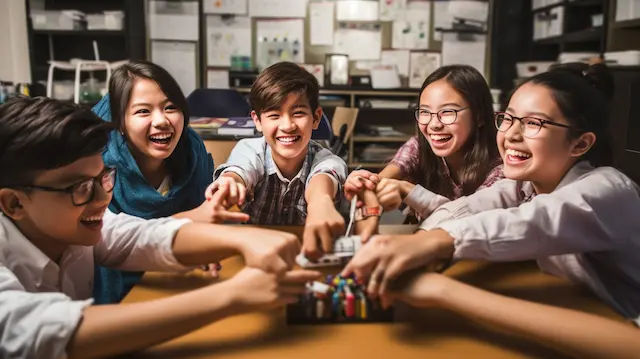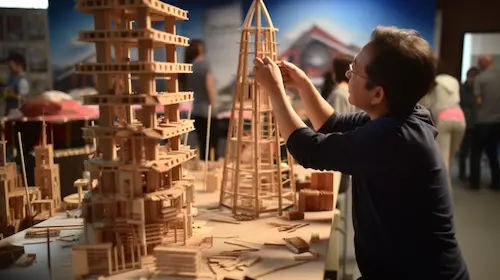Team Building Games For Students Singapore

Team building plays a crucial role in the development of students, fostering cooperation, communication, and essential life skills. In the dynamic educational environment of Singapore, team building games have gained significant popularity for their ability to engage students and promote collaboration. These games offer a range of benefits, including the development of leadership skills, enhanced problem-solving abilities, and the promotion of teamwork among students. In this article, we will explore the best team building games for students in Singapore in 2023.
Understanding the Importance of Team Building for Students
Team building activities hold immense importance in educational settings. They provide students with opportunities to develop critical social and emotional skills, such as effective communication, empathy, and collaboration. Through engaging in team building games, students can enhance their problem-solving abilities, learn to work in diverse groups, and develop a sense of responsibility towards their peers. Moreover, team building activities have been shown to positively impact academic performance, as they create a conducive learning environment where students can thrive both individually and collectively.
Benefits of Team Building Games for Students
- Enhanced Communication Skills: Team building games improve verbal and non-verbal communication among students. Through collaborative challenges and group discussions, students learn to express their ideas, actively listen to others, and build stronger connections.
- Collaboration and Cooperation: These games foster a sense of collaboration and cooperation among team members. By working together towards a common goal, students develop a sense of camaraderie and learn the value of collective effort.
- Leadership Development: Team building games provide opportunities for students to develop leadership qualities. Students can take charge, make decisions, and motivate their team members, thereby enhancing their leadership skills.
- Problem-Solving Abilities: These games enhance critical thinking and problem-solving skills in a fun and interactive manner. Students learn to analyze problems from different perspectives, think outside the box, and develop innovative strategies.
- Building Trust and Relationships: Team building games promote trust, empathy, and positive relationships among students. Through shared experiences, students develop trust in their team members, learn to respect individual differences, and cultivate relationships that contribute to a supportive learning environment.
- Increased Self-Confidence: Participating in team building games boosts students’ self-confidence and self-esteem. As they successfully navigate through challenges and achieve goals, students gain a sense of accomplishment, which positively impacts their confidence levels.
- Resilience and Adaptability: Team building games teach students to be resilient, adaptable, and open to new experiences. By handling setbacks, embracing change, and persisting through challenges, students develop resilience and adaptability skills.
- Cultural Understanding and Inclusion: Team building games encourage cultural understanding and inclusivity among diverse groups of students. By collaborating and appreciating different perspectives, students develop respect for diversity and foster an environment of inclusivity.
Fun Team Building Games for Students in Singapore
1. Terrarium Workshop

The Terrarium Workshop is a team building game for students that encourages creativity, collaboration, and unity. They work together to create their own terrariums, developing communication, problem-solving, and teamwork skills. This engaging activity fosters connections with nature, strengthens peer relationships, and creates a sense of accomplishment through shared efforts.
2. Tower of Success

Teams compete to build the tallest tower using only given materials. This game encourages creativity, teamwork, and problem-solving as students collaborate to design and construct a stable tower structure. The objective is to work together to create a tower that stands tall and embodies the spirit of success.
3. Mission Impossible

In this game, students work together to complete a series of challenging tasks within a given time limit. The tasks may involve physical and mental challenges, requiring effective communication, collaboration, and quick thinking. Mission Impossible promotes teamwork, decision-making skills, and resilience as students strive to accomplish the mission’s objectives.
4. The Great Egg Drop

Teams are tasked with designing and building a protective contraption to prevent an egg from breaking when dropped from a height. This game encourages critical thinking, innovation, and problem-solving as students engineer creative solutions to safeguard the delicate egg. The objective is to successfully drop the egg without it cracking, showcasing students’ design and engineering skills.
5. Obstacle Course Relay

Teams navigate through a series of obstacles as a relay race. Students must work together, communicate effectively, and demonstrate coordination to overcome hurdles and complete the course. This game promotes cooperation, time management, and physical coordination while fostering a sense of teamwork and healthy competition.
6. Beach Ball Bonanza

Teams keep a beach ball in the air using only specific body parts, such as their elbows or heads. This game requires coordination, communication, and quick reflexes as students strategize to keep the ball from touching the ground. It promotes teamwork, coordination, and laughter as participants engage in a lighthearted and energetic activity.
7. Marshmallow Challenge

Teams compete to build the tallest freestanding structure using spaghetti sticks, tape, and a marshmallow. This game encourages creativity, teamwork, and strategic thinking as students plan, collaborate, and construct their marshmallow towers. The objective is to design a stable structure that can support the marshmallow on top.
8. Minefield

Students navigate blindfolded through a “minefield” created with objects on the ground. They rely on trust, effective communication, and teamwork as they guide and support each other through the obstacles. This game emphasizes trust-building, communication skills, and cooperation as students rely on their teammates to provide guidance and ensure a safe passage.
9. Puzzle Race

Teams race against each other to complete a puzzle. This game promotes problem-solving, collaboration, and healthy competition as students work together to assemble the puzzle pieces. The objective is to be the first team to successfully complete the puzzle, fostering teamwork and critical thinking skills.
10. Build a Bridge

Teams design and construct a bridge using specific materials. This game focuses on engineering principles, collaboration, and effective project management. Students work together to create a sturdy and functional bridge structure that can support a specified load. The objective is to design a bridge that meets the given criteria, highlighting students’ creativity and engineering skills.
Tips for Successful Implementation of Team Building Games
To ensure successful implementation of team building games, educators or facilitators should consider the following tips:
- Plan ahead and select games that are age-appropriate, safe, and inclusive for all participants.
- Clearly communicate the objectives and rules of each game to the students.
- Create a positive and supportive environment where students feel comfortable participating and expressing themselves.
- Encourage active participation and equal involvement from all team members.
- Facilitate debriefing sessions after each game to reflect on the experience, discuss the lessons learned, and connect them to real-life situations.
Team Building Games For Students Singapore
Team building games are powerful tools that contribute to the holistic development of students in Singapore. By engaging in these fun and interactive activities, students not only develop essential life skills but also cultivate positive relationships, boost self-confidence, and foster a supportive learning environment. Educators, parents, and students are encouraged to actively participate in team building games to enhance the overall educational experience and promote lifelong skills that will benefit students throughout their academic and professional journeys.
Looking for more articles? Check out our recommendations below:
- Ultimate Guide To Team Building In Singapore (2025)
- Best Team Building Activities In Singapore (2025)
- Best Team Building Activities For Small Groups in Singapore (2025)
- Best Team Building Games For Adults in Singapore (2025)
- Best Team Building Activities For Students In Singapore (2025)
Frequently Asked Questions (FAQ)
If you have any questions about team building games for students in Singapore, you can refer to the frequently asked questions (FAQ) about the best Fun Team Building Games for Students In Singapore below:
What age group are these team building games suitable for?
These team building games are designed to cater to various age groups of students, ranging from primary school to secondary school.
How can team building games benefit academic performance?
Team building games enhance skills such as communication, problem-solving, collaboration, and critical thinking, which are transferable to academic settings. These skills contribute to improved academic performance and classroom engagement.
Are there any safety considerations to keep in mind during the games?
Safety is paramount during team building games. Educators and facilitators should conduct a risk assessment, ensure proper supervision, and provide clear instructions to minimize potential hazards and prioritize the well-being of the participants.
How do team building games promote inclusivity among diverse groups of students?
Team building games provide a platform for students from diverse backgrounds to collaborate, appreciate different perspectives, and work towards a common goal. This promotes inclusivity, understanding, and respect among the participants.
Can these games be adapted for different group sizes?
Yes, these team building games can be adapted based on the group size by adjusting rules, time limits, and the number of participants per team. The flexibility allows customization to suit different group dynamics.
How can educators measure the effectiveness of team building games?
Educators can measure the effectiveness of team building games through student feedback, observations of teamwork and communication, assessments of individual and group performance, and tracking improvements in skills such as problem-solving, collaboration, and leadership.
Are there any specific materials or resources required for these games?
The materials and resources required for these team building games may vary depending on the specific game. Educators should provide the necessary instructions and ensure that the required materials are readily available for students to participate in the games.
How can team building games enhance social and emotional skills in students?
Team building games provide opportunities for students to practice and develop social and emotional skills such as effective communication, teamwork, empathy, resilience, and leadership. Through collaborative challenges and interactions, students learn to navigate social dynamics and build positive relationships.
Can team building games be integrated into the regular curriculum?
Yes, team building games can be integrated into the regular curriculum as they align with the development of important life skills and social-emotional learning. Educators can incorporate team building activities as part of classroom lessons, outdoor education programs, or special events to enhance student engagement and skill development.
Are there any team building games that specifically focus on leadership development?
Yes, several team building games are designed to specifically focus on leadership development. Gam
